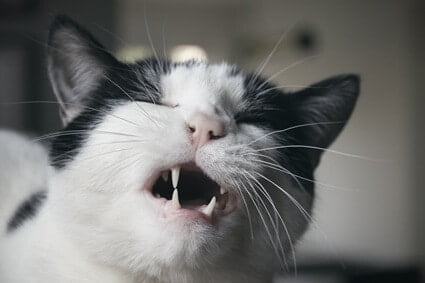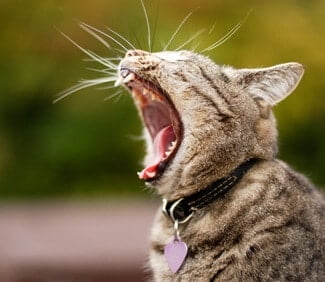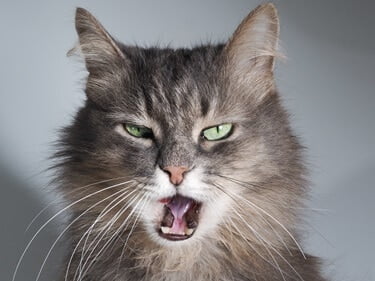A cat grinding its teeth is known as bruxism, a habit with an unmistakable grating sound. Don’t make the mistake of assuming that your cat has just picked up an unwanted habit, as bruxism is usually a warning sign of another problem.
Causes of bruxism include gum disease, broken teeth, ulcers, or cavities for bruxism. Cats also grind their teeth when stressed, dehydrated, or irritated by foreign objects in the mouth. Teeth grinding can also point to a neurological issue, low potassium levels, or cancer, although this is rare.
Bruxism is not simply a bad habit for cats, and you cannot rely on training to put a stop to it. If your cat is grinding its teeth, it is masking pain caused by a different ailment. Seek to have this diagnosed and rectified before your cat’s teeth are irrecoverably damaged.
Is it Normal for Cats to Grind Their Teeth?
Teeth grinding in cats, known as feline bruxism, should never be considered normal. Cats don’t grind their teeth without good reason.
If a cat is grinding its teeth, it will almost certainly be a conscious, willful act – usually born of discomfort. Oral health complaints are a common issue in cats, especially as they age.
If you’re looking at your pet and asking yourself, “why do old cats grind their teeth?” you’re posing the wrong question. A better query is, “why cats grind their teeth?” Bruxism is not a quirky, harmless habit that comes with age.
What Does Cat Teeth Grinding Sound Like?
If your cat is making weird mouth movements or salivating to excess, you may discover that your cat is grinding its teeth. Other odd behaviors to look out for include a cat’s jaw trembling or your cat clenching its teeth.
The sound of feline bruxism is best compared to a cat’s teeth chattering. Your cat may look like it’s chewing while making this sound, despite no food being in the vicinity. Most importantly, the cat’s jaws will move from side to side rather than up and down.
Bruxism is a sound that you may not initially notice but becomes impossible to ignore once you’re aware of it. The sound of a cat grinding its teeth will invariably become grating before long.
Does a Cat That Grinds its Teeth Need a Vet?
A cat that experiences bruxism is likely in some degree of pain. As a result, take a cat that starts grinding its teeth and drooling to a vet. Before making an appointment, consider potential reasons for the behavior.
The sooner you discover bruxism and act, the more comfortable your cat will be. Most cats don’t intentionally grind their teeth. It’s possible that your cat is doing so when sleeping, though.
Some causes of bruxism are comparatively simple to resolve. With the aid of medication, a vet will get your cat purring again in no time. Your cat may require oral surgery, though, and a handful of explanations are more troubling. Therefore, rapid intervention is crucial.
What Causes Cats to Grind Their Teeth?
As intimated, there are many possible reasons why bruxism in cats may arise. Here are the likeliest causes. In most cases, tooth grinding stems from a fixable ailment. Do not lose sight of the fact that your cat is in pain.
Stress and Anxiety
Before embarking on any examinations, consider whether your cat’s bruxism stems from stress. Emotional disquiet could explain why your pet is grinding its teeth. Anxiety is a less common explanation than a physical complaint, but it does happen.
It’s surprisingly easy to inflict stress upon a cat. Any variation in routine will plunge a cat into turmoil, such as new arrivals in your home or a change in working patterns. Equally, if your cat lives with other animals, dominant housemates may become bullies.
Unfortunately, feline bruxism and stress can be a chicken-and-egg scenario. Is your cat grinding its teeth because it is stressed? Or is physical pain causing your cat stress, which in turn leads to grinding of teeth? Investigate all possible scenarios before assuming that your cat’s issues are purely psychological.
Acid Reflux (Esophagitis)
Esophagitis is a relatively common complaint in cats. A form of acid reflux, the condition occurs when acid rises from the esophagus. This often creates excess saliva, as well as discomfort. If your cat grinds its teeth before vomiting, esophagitis is likely to blame.
Esophagitis has many possible causes, so you should have your cat investigated. These diagnoses vary from mild to concerning. Catching the problem early means a far greater chance of success.
The Journal of the American Animal Hospital Association explains that 2-3 patients recover from esophagitis following treatment. Following diagnosis, a vet will prescribe medication, and owners instructed to feed a specific, tailored diet.

Dehydration
Dehydration is a surprisingly common explanation for bruxism. A dehydrated cat will experience acid reflex, akin to a mild form of the aforementioned esophagitis. As discussed, this will lead to grinding of the teeth.
Gently pinch the skin around your cat’s neck. If this snaps back into place, the cat is suitably hydrated. If the skin is loose and reluctant to reform, do what you can to get your cat to drink. Bruxism is just one of many issues that arise from feline dehydration.
Inappropriate Diet
Is your cat grinding teeth when eating? If so, your pet may be struggling to chew and break down its food. This is particularly likely with senior cats that are consuming a dry food diet.
As cats grow older, their teeth age with them. Older cats lack the power in their teeth and jaws to crunch through hard kibble. It may be worth considering transitioning your senior pet onto a wet food diet for its golden years.
If your cat prefers kibble, you can still feed dry food. Just ensure it is age-appropriate. Any reputable cat food brand will have a senior range, which offers smaller chunks that are easier to chew and swallow. You can also soften the food up further with gravy.
Foreign Objects in the Teeth
You may find your cat is prone to grinding its teeth after grooming. If this is the case, check that the cat does not have a foreign object trapped in the teeth.
Cats do not use dental floss, so it’s common for hair, dirt, or grit to become trapped in the teeth and cause irritation. The grinding is an attempt to dislodge these unwanted intrusions.
Foreign invaders in the mouth are also motivation to brush your cat’s teeth. You’ll need a specialist toothbrush and toothpaste from a pet store. Brushing is a good practice, though. As we’ll elaborate upon, oral health issues commonly link to bruxism.
Loose or Broken Teeth
Bruxism is common in older cats. One of the explanations for this is senior animals are starting to lose teeth. Once your cat reaches geriatric status, it is increasingly unlikely to retain all 30 of its pearly whites.
If a tooth is loose, it will irritate a cat. If the cat has a broken tooth, this is even more problematic. The break may lead to cuts on the tongue and invite infection. Bruxism is an attempt by the cat to self-soothe.
If your cat is experiencing loose or broken teeth, arrange to have them removed professionally. This ensures the eventual tooth loss will be managed and treated accordingly. Leaving nature to take its course can be dangerous for your pet.
Tooth Cavities
Do you brush your cat’s teeth? If not, your pet will likely eventually experience cavities. While cats are primarily indifferent to sugar, they can still find that teeth waste away over time without providing the appropriate care. Tooth cavities are easy to spot in cats. Common symptoms include:
- Refusal to eat or drink
- Pawing at the mouth
- Verbalizing
- Aggression when touched around the mouth
- Foul breath
- Excessive drooling, especially from one side of the face
Of course, bruxism accompanies these symptoms. Then grinding of teeth is mainly to manage the pain of a cavity. Your cat will be treated with a thorough tooth cleaning if possible, though extraction may be essential.
Gum Disease
Where cavities appear, gum disease invariably follows. Almost all cats are at risk of gum disease, which can be extremely painful. The symptoms are identical to cavities and will again result in a cat grinding its teeth.
The most common form of feline gum disease is gingivitis, aka periodontal disease. Gingivitis is caused by plaque and bacteria on your cat’s teeth. Left untreated, this leads to inflammation around the gum.
As explained by the Journal of Veterinary Dentistry, gingivitis must be addressed urgently. Failure to reverse this condition will cause it to spread. After this, the cat will almost certainly lose teeth – and may experience further bacterial infection throughout the body.
Mouth Ulcers (Stomatitis)
If feline gum disease is not managed and treated, stomatitis may follow. This is a condition that leads to a range of painful ulcers in the mouth of your cat.
To treat stomatitis, address the cause – ordinarily gum disease. If this is not the case, investigate why your pet has ulcers. You can increase your cat’s comfort with antibiotics and NSAIDs, but this only relieves symptoms. It cannot be considered a cure.
Tooth Resorption
As cats grow older, they are increasingly likely to experience tooth resorption. When a tooth is resorbed, the enamel and dentin wear away. Such organic damage makes the tooth increasingly fragile, potentially exposing the root.
The process is every bit as painful as it sounds. Your cat will grind its teeth constantly in an attempt to soothe itself. The only way to resolve tooth resorption is through professional extraction. Attempting to rebuild the tooth will not rectify damage to the gums or roots.
Misaligned Teeth (Malocclusion)
Brachycephalic feline breeds with flat faces can be prone to malocclusion. Also known as misaligned teeth, cats with malocclusion see one set of teeth – most commonly, in the upper mouth – grow disproportionate in size to the other.
Malocclusion can lead to unwitting and unintentional grinding of the teeth. The cat is unable to close its mouth and rest the teeth organically. Naturally, this must be resolved.
A professional will discuss your options for dealing with feline malocclusion. You’ll likely need to choose between tooth extraction, resizing the teeth under anesthesia, or fixing a feline retainer to move the misplaced teeth.
The latter approach is challenging and will require the expertise of a veterinary dentist. Such services will be costly, and there are no guarantees of success. Many vets prefer to remove misaligned upper teeth immediately, offering instant relief for the cat.
Misaligned Jaw
In addition to the teeth, the temporomandibular joint can become misaligned in some cats. The TMJ, as it is commonly known, connects a cat’s lower jaw to the skull.
If this joint becomes misaligned, the cat will struggle to open its mouth. As a result, tooth grinding will become unavoidable – especially when eating.
A misaligned TMJ is known as ankylosis. Veterinary and Comparative Orthopedics and Traumatology explain that the issue can stem from tumors or physical trauma. As always, the sooner this issue is addressed, the better the prognosis will be for your cat.
Sickness and Nausea
Sometimes, cats grind their teeth because they are feeling sick or nauseous. There are many possible explanations for this, including:
- Overeating
- Consuming inappropriate food or liquid
- Hairballs in the digestive tract
- Allergies
- Heatstroke
- Intestinal parasites
- Pancreatitis
None of these concerns are enjoyable for a cat. Keep an eye on your pet and watch for any signs. Consistent vomiting and refusal to eat, alongside grinding of the teeth, merits a professional investigation.
Of course, if we all ran to a vet every time a cat vomited, we’d never leave. Bruxism alongside nausea is a concern, though. Anything longer than 24 with these symptoms should be considered a concern.
Irritable Bowel Syndrome
The Journal of Nutrition confirms that cats can struggle with irritable bowel syndrome, aka IBS. As with humans, this manifests as inflammation in the cat’s bowels. IBS causes frequent diarrhea but equally leads to painful stomach cramps in between episodes.
It is these cramps that will inspire bruxism in a cat. As your pet will be keen to avoid announcing discomfort, it will soothe itself any way it can. Grinding the teeth is a way to manage physical pain.
Before diagnosing IBS, ensure the issue is not a temporary concern. A whipworm infestation, for example, will display all the same symptoms as IBS. Allergic reactions or unfamiliar foods also provoke similar responses. Have a vet look at your cat to be safe, though.

Low Potassium (Hypokalemia)
Hypokalemia occurs in felines when your cat lacks potassium. As explained by the Journal of the American Veterinary Medical Association, hypokalemia is commonly linked to renal failure. Cats will grind their teeth to manage the discomfort caused by this.
Keep an eye out for the warning signs of hypokalemia. If you catch hypokalemia in your cat early, you can reverse the condition. Even so, consider this a warning sign of future concerns. A vet must regularly monitor the performance of your cat’s kidneys.
If you feed your cat a diet suitable for its age, hypokalemia is less likely to arise. Look out for muscular weakness (especially in the neck), loss of appetite, and substandard fur quality, though. Along with bruxism, these issues suggest low potassium levels.
Neurological Issues
A cat’s tooth grinding behavior may stem from the brain, not the body. If your cat is prone to seizures, this could manifest as bruxism. When a cat experiences an episode, control of the cerebral cortex is lost. Shaking follows throughout the body, including the teeth.
Bruxism is most common in mild seizures. In these instances, your cat will temporarily lose consciousness. The cat may not close its eyes in such an instance. It will look relatively peaceful – except for grinding teeth.
A more severe seizure will involve a cat verbalizing, often screaming like a child in pain. These cats will also display significant bruxism, as though determinedly chewing thin air. Any cat prone to seizures will require lifelong medication and, likely, a specialist diet.
Cancerous Tumors
Any cat can fall victim to squamous cell carcinoma, though it becomes increasingly common in older felines. Cats that live in a smoking household are also at higher risk, as per Veterinary Pathology.
When your cat gets older, routine check-ups will include any warning signs of cancer. If your cat is behaving strangely, though, be sure to bring forward an assessment.
Always remember that bruxism is a symptom of another concern or condition, not a medical complaint in and of itself. If your cat is grinding its teeth, intervention is needed.


My British Shorthair is 20 months old yesterday she started grinding her teeth on the left side. I cannot find any reason for this. She is perfectly healthy. Eating and drinking normally. Coat is fine. She is playful. Do I need to take her to the vets
When mine rubs her cheek to scratch against my fingers while purring, I can feel her grinding that side. She’s age 3 yrs.